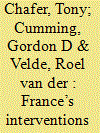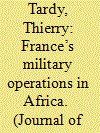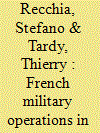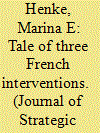|
|
|
Sort Order |
|
|
|
Items / Page
|
|
|
|
|
|
|
| Srl | Item |
| 1 |
ID:
171707


|
|
|
|
|
| Summary/Abstract |
France’s interventions in Mali and the wider Sahel appear to mark a new departure in French military policy in terms of the approach to multilateralism adopted, the regionalisation of the response, and the levels of violence deployed. Yet how ‘new’ is this approach, when set against the historical backdrop of French military interventions in Africa? Should it be seen as a modified version – an adaptation – of the new type of multilateral engagement that emerged in the wake of the 1994 Rwandan genocide? Using a historical institutionalist lens, employing the notions of critical junctures, ‘layering’, and ‘drift’, this article briefly sets out the unilateral approach that marked French military policy in Africa prior to 1994 before going on to analyse the multilateral approach and associated path-dependent practices that emerged after the Rwandan genocide. Drawing on elite interviews in Europe, the US and Africa, the article shows that, while France’s engagement in the Sahel is characterised by an ostensibly novel multilateral approach, it does in fact combine new and old norms, ideas and practices.
|
|
|
|
|
|
|
|
|
|
|
|
|
|
|
|
| 2 |
ID:
171709


|
|
|
|
|
| Summary/Abstract |
This article examines France’s institutional preferences in the context of its military operations in Africa. It argues that, if France had its multilateral moment in the 1990s and 2000s, it has since become institutionally agnostic. Institutional agnosticism means that France no longer has strong institutional preferences when running military operations; instead, it has over the last six or seven years opted for various frameworks based on a pragmatic analysis of what institutions – the UN, the EU, the G5 Sahel or regional organisations – bring. France is opportunistic as it wants to keep open all options while retaining the right to run unilateral missions. The first part presents the evolution of French military operations over time and how they have become increasingly multilateral after the end of the Cold War. The second part aims to unpack why France has embraced multilateralism, identifying three main issues: multilateralism as burden-sharing, multilateralism as legitimacy provider, and the African continent as a theatre for the operationalisation of the EU’s Common Security and Defence Policy. In the third part, the article looks at why France has become institutionally agnostic and why it continues to run national operations as a consequence of institutional agnosticism.
|
|
|
|
|
|
|
|
|
|
|
|
|
|
|
|
| 3 |
ID:
171706


|
|
|
|
|
| Summary/Abstract |
After the end of the Cold War, Paris’s traditional, paternalistic interference in Francophone Africa became increasingly questioned. Partly in response to that, over the last two-and-a-half decades, France’s Africa policy has emphasised multilateral cooperation and local capacity building through the United Nations, the European Union, and various ad hoc multilateral frameworks. This special issue aims to unpack and assess France’s efforts to (a) re-legitimise its military presence on the African continent by securing political endorsements from multilateral bodies; (b) share burdens and liabilities through greater reliance on collective implementation; and (c) re-affirm its own status as a leading power by often spearheading collective military missions.
|
|
|
|
|
|
|
|
|
|
|
|
|
|
|
|
| 4 |
ID:
171708


|
|
|
|
|
| Summary/Abstract |
Scholars argue that the 1991 Gulf War, when the United States worked hard to secure approval from the United Nations (UN), set a precedent for legitimate military intervention that other states, especially other liberal democracies, subsequently felt compelled to follow. France, however, continued to intervene unilaterally in its traditional African sphere of influence for several years, without seeking approval from the UN or regional bodies. Even after France drew widespread opprobrium for its support of a murderous regime in Rwanda, French leaders deployed thousands of combat troops unilaterally on various missions. This article relies on original interviews with French policymakers as well as on primary documents to make the case that the 2002–04 Côte d’Ivoire intervention finally steered French Africa policy towards greater multilateralism. It drove home the danger that unilateral interventions could fuel anti-French sentiment among African audiences, undermining France’s regional influence. Ultimately, therefore, concerns about African acceptance more than broader international pressure led France to fully embrace new norms of legitimate intervention.
|
|
|
|
|
|
|
|
|
|
|
|
|
|
|
|
| 5 |
ID:
171710


|
|
|
|
|
| Summary/Abstract |
President François Hollande entered public office in 2012 with a non-interventionist agenda that promised to draw down French troops in Africa and promoted collective African and European mechanisms to reduce France’s military footprint in the region. One year later, the same president deployed 4,000 combat troops to Mali, initially without any multilateral participation. To understand this apparent contradiction between multilateral rhetoric and operational unilateralism, this article looks at France’s efforts in previous years to establish African and European military operations in support of the Malian state. The article finds that France’s commitment to multilateralism is genuine yet not absolute – meaning that French policy-makers do not shy away from operational unilateralism if conditions on the ground seem to require swift and robust military action, as long as they can count on the political support of key international partners.
|
|
|
|
|
|
|
|
|
|
|
|
|
|
|
|
| 6 |
ID:
171711


|
|
|
|
|
| Summary/Abstract |
What factors explain the institutional shape of military interventions spearheaded by France? This article suggests that Intervention Entrepreneurs are the deciding agents. To secure the viability of their intervention proposal, they select an intervention venue based on pragmatic grounds. Most importantly, they carefully study possible domestic and international opposition to their intervention plans and conceive institutional intervention choices accordingly. The result is an ad hoc selection of intervention venues with little impact of political ideology, norms, organisational interests, or historical learning. Moreover, on many occasions, little attention is paid to which intervention format would most benefit the peace and prosperity in the conflict theatre in the medium to long term. The article illustrates this argument by tracing French institutional decision-making for interventions in Chad/CAR, Mali, and Libya.
|
|
|
|
|
|
|
|
|
|
|
|
|
|
|
|
|
|
|
|
|